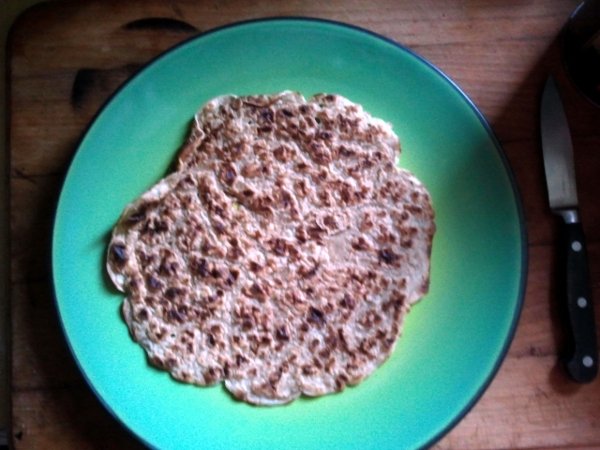I’m currently reading Portrait of the Potteries by Bill Morland, published by Robert Hale Ltd. in 1978.
Being a local delicacy, oatcakes (posts passim) get an honourable mention. Indeed on page 25 Mr Morland does more than praise them, he speculates as to their origin (although he hyphenates oat-cakes. Ed.):
It is nothing like the Scottish oat-cake, but is rather like a brown and nobbly pancake made from draught-porridge. Incredibly economical to product, oat-cakes are very nourishing and sustaining. They are a symbol of the isolation and conservatism of the valley, since they appear to be an iron-age survival.

However, Mr Morland provides no evidence of the Iron Age origins of the Staffordshire oatcake, although one would have thought that, as an archaeology teacher for Keele University’s Adult Education Department at the time of publication, he would have realised the importance of empirical evidence.
If anyone can shed light on the (pre)history of the Staffordshire oatcake, please feel free to comment below.
I can’t say anything about the Staffordshire *oatcake* but through my mother’s mother’s family (from Wolverhampton, Staffordshire), I call small, circular, thick, pancakes, cooked on a hot plate in an individual ring to hold and shape the batter *pikelets*; these are what are known elsewhere and sold commercially as *crumpets*.
Also, from the same maternal source, *I guess* (a West Midlands phrase before it crossed the Atlantic), I call small flat cakes cooked on a griddle *bakestones* (after another name for the cooking implement), not *welshcakes*.
Hi Westengland
Many thanks for the insights from your family’s days in Wolverhampton (which was where I did my degree, incidentally).
The oatcake shops in the Potteries also sell pikelets, but these are different to the crumpet-like pikelets you mention. For instance, at TJ’s Oatcakes (map) where I buy my oatcakes, pikelets are also available, but these are a larger, thicker version of the oatcake with added dried fruit and thus resemble a larger version of the fruit pancakes available in the bakery section of supermarkets.
Nevertheless, they are – like the oatcake itself – cooked on a griddle, commonly referred to as a ‘baxton’ (bakestone) in local dialect.